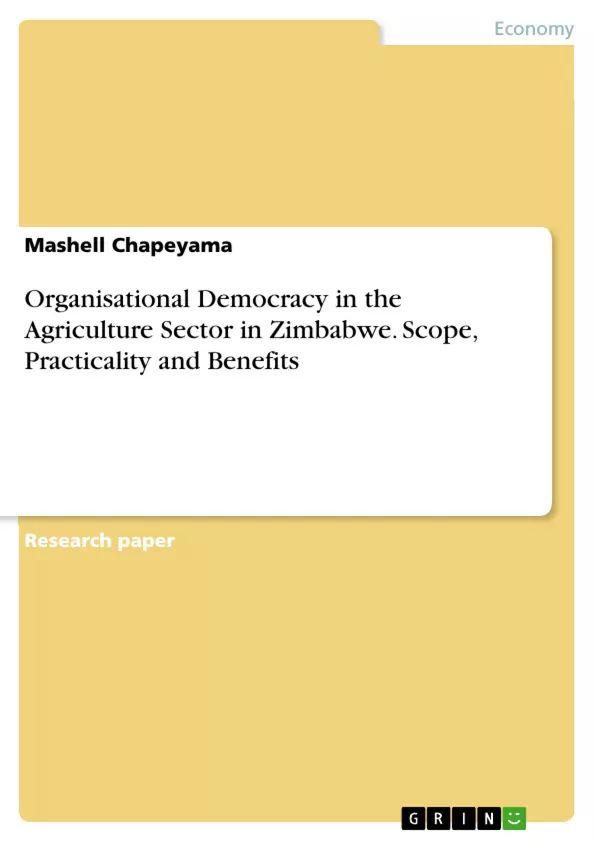Orientation: this study is a critical analysis on the role of organizational democracy in the function, effectiveness and productivity of an organization.
Research Purpose: the purpose of this study was to investigate the relationship that exists between organizational democracy and productivity as well as to identify the potential of organizational democracy in Zimbabwe.
Motivation of the study: A scientific inquiry is vital to assess the role organizational democracy can play in enhancing organizational vitality, productivity and cohesion. From such a study the practicality of organizational democracy can be assessed and a frame work can be proposed through which employees participate in organizational structures and systems.
Research Design, approach and Method:
A quantitative survey comprising group interviews and questionnaire was carried out. Ninety participants from nine agricultural companies in the Chipinge District of Zimbabwe took part in the research. The response rate for the questionnaire was 84%.
.
Main Findings: Organizational democracy is positively related to productivity. There is no universal standard of industrial democracy, but its nature depends on the current socioeconomic and political environment in which the organization exists. An organization can also evolve from one democratic structure to another in response to the changing environment.
Practical/Managerial implications: the form democracy takes must come as a result of dialogue and consultation with employees and stakeholders. Understanding the environment in which the organization exists would provide vital input to the nature of employee participation in the decision making process.
Contribution/value-added: the study showed that consultation, consent, dialogue and mutuality are important ingredients in the nature of organizational democracy and they influence the resultant benefits.
Inhaltsverzeichnis (Table of Contents)
- Introduction
- Literature Survey
- History of industrial democracy
- Forms democracy can take at work
- Guiding Principles of Industrial Democracy
- Aspects of industrial Democracy
- Areas of Involvement
- Why the Need for Democracy in the Workplace
- Controversy surrounding democracy at the workplace
- Method
- Population and Sampling
- Research Method
- Measuring Instruments
- Group Interviews
- Questionnaire
- Recording Data
- Data Analysis
- Results
- Discussion
- Limitations of the study
- Conclusions
- Acknowledgement
- References
- Appendix 1 Questionnaire
- Appendix 2 results
Zielsetzung und Themenschwerpunkte (Objectives and Key Themes)
This study critically analyzes the role of organizational democracy in the functionality, effectiveness, and productivity of an organization. It aims to investigate the relationship between organizational democracy and productivity and to identify its potential in Zimbabwe. The study explores the practical aspects of organizational democracy and proposes a framework for employee participation in organizational structures and systems.- The impact of organizational democracy on productivity in an organization
- The practical application of organizational democracy in the agricultural sector in Zimbabwe
- The relationship between organizational democracy and productivity
- The influence of socio-economic and political environments on the nature and implementation of industrial democracy
- The importance of consultation, consent, dialogue, and mutuality in promoting organizational democracy
Zusammenfassung der Kapitel (Chapter Summaries)
The introduction provides an overview of the study's objectives and context, highlighting the increasing prevalence of industrial democracy in developed countries and its limited adoption in developing nations, particularly in Africa. The literature survey examines various perspectives on industrial democracy and its potential for enhancing productivity and organizational peace, drawing upon relevant research and studies. It emphasizes the importance of employee participation, social dialogue, and the extension of democratic principles to the workplace. The study's methodology section outlines the quantitative survey approach, including group interviews and questionnaires, with a focus on the agricultural sector in Zimbabwe.Schlüsselwörter (Keywords)
The main keywords of the study include organizational democracy, employee participation, productivity, consultation, dialogue, scope of democracy, and co-determination. These terms encapsulate the study's focus on exploring the connection between organizational democracy and productivity, particularly within the context of the agricultural sector in Zimbabwe. The research delves into the impact of employee involvement, dialogue-driven decision-making, and the broader socio-economic factors influencing the implementation and effectiveness of democratic structures in the workplace.Frequently Asked Questions
What is the relationship between organizational democracy and productivity?
The study's main finding is that organizational democracy is positively related to productivity, enhancing organizational vitality and cohesion.
Why was the study focused on the agricultural sector in Zimbabwe?
The research aimed to identify the potential and practicality of organizational democracy within a specific developing economy context, using nine agricultural companies in the Chipinge District.
What are the key ingredients of organizational democracy according to the findings?
Important ingredients include consultation, consent, dialogue, and mutuality between employees and management.
Is there a universal standard for industrial democracy?
No, the study concludes that the nature of democracy depends on the current socio-economic and political environment in which the organization exists.
What methodology was used in this research?
A quantitative survey design was used, comprising group interviews and questionnaires with 90 participants from agricultural companies.
What are the managerial implications of this study?
Managers should implement democracy through dialogue and consultation, ensuring that the form of participation aligns with the specific environment of the organization.
- Quote paper
- Mashell Chapeyama (Author), 2012, Organisational Democracy in the Agriculture Sector in Zimbabwe. Scope, Practicality and Benefits, Munich, GRIN Verlag, https://www.grin.com/document/200684



